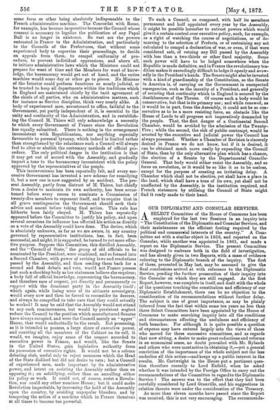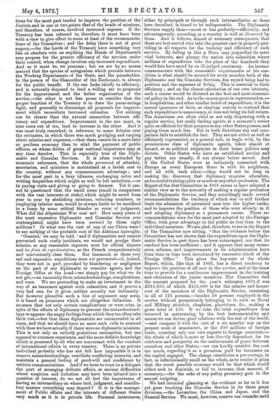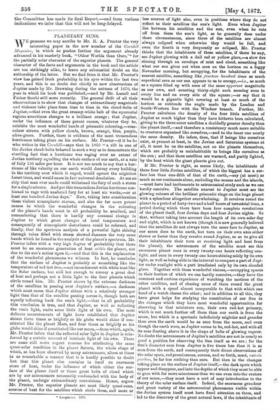OUR DIPLOMATIC AND CONSULAR SERVICES.
ASELECT Committee of the House of Commons has been employed for the last two Sessions in an inquiry into " The Constitution of the Diplomatic and Consular Services, and their maintenance on the efficient footing required by the political and commersial interests of the country." A Com- mittee sat with a similar object in 1858, and reported on the Consular, while another was appointed in 1861, and made a report on the Diplomatic Service. The present Committee was designed to embrace both in the field of investigation, and has already given in two Reports, with a mass of evidence referring to the Diplomatic branch of the inquiry, The first of these, presented in May last, may be assumed to give the final conclusions arrived at with reference to the Diplomatic Service, pending the further prosecution of their inquiry into the Consular on which they are still engaged. As the first Report, however, was complete in itself, and dealt with the whole of the questions touching the constitution and efficiency of our Diplomatic Establishment, there can be no objection to the consideration of its recommendations without further delay. The subject is one of great importance, as may be plainly inferred from the fact that within some ten years no lees than three Select Committees have been appointed by the House of Commons to make searching inquiry into all the conditions and circumstances affecting the usefulness and efficiency of both branches. For although it is quite possible a question of expense may have entered largely into the views of those who moved for these successive committees, and as regards that now sitting, a desire to make great reductions and reforms in an economical sense, no doubt prevailed with Mr. Rylands and others who were most active in obtaining it,—yet a general conviction of the importance of the whole subject not the less underlies all this action—and keeps up a public interest in the results. Mr. Cartwright in the House put a pertinent ques- tion therefore recently to Lord Enfield, when he asked whether it was intended by the Foreign Office to carry out the recommendations of the Committee in regard to the Diplomatic Service ? The answer was to the effect that they had been carefully considered by Lord Granville, and his suggestions in relation thereto were under the consideration of the Treasury.
As more than eleven months have passed since the Report was received, this is not very encouraging. The recommenda- tions for the most part tended to improve the position of the Juniors, and in one or two points that of the heads of missions, and therefore, of course, involved increased expense. If the Treasury has been referred to, therefore, it must have been with a view to give effect to some at least of the recommenda- tions of the Committee ; and the delay there is not of good augury,—for the Lords of the Treasury have something very like an absolute veto on anything the Heads of Departments may propose for the greater efficiency of the services under their control, when change involves any increased expenditure. And so it must be, we presume ; but we are by no means assured that the species of antagonism which prevails between the Working Departments of the State, and the purseholder, in the person of the Chancellor of the Exchequer, is always for the public benefit. If the one looks chiefly to efficiency, and is naturally disposed to lend a willing ear to proposals for the improvement and the better organization of the service,—the other is not less prone to consider that the proper function of the Treasury is to draw the purse-strings tight, and generally to discourage all proposals for improve- ment which necessitate increased estimates. Yet nothing can be clearer than the natural connection between effi- ciency and expenditure. Improvement in the one must, in nine cases out of ten, lead to increase in the other. And it was most truly remarked, in reference to some debates over the estimates, in which there was much grudging and carping about salaries and expenses,—that there cannot be a more false or perilous economy than to stint the payment of public officers, on whom duties of great national importance may at any time devolve. This is especially true of the Diplo- matic and Consular Services. It is often contended by economic reformers, that the whole personnel of attaches, secretaries, and ministers is maintained at a lavish cost to the country, without any commensurate advantage ; and for the most part in a busy idleness, exchanging notes and writing despatches which might as well be left unwritten,—or in paying visits and giving or going to dinners. Yet it can- not be questioned that the small sums (small in comparison with the vast interests at stake) which might be saved from year to year by abolishing missions, reducing numbers, or employing inferior men, would be always liable to be sacrificed in a lump by • some critical blunder or error of judgment. What did the Abyssinian War cost us ? How many years of the most expensive Diplomatic and Consular Service ever contemplated, might have been covered by those eight millions ? Or what was the cost of any of our China wars ? to say nothing of the probable cost of the Alabama imbroglio.
' Granted,' we may be told, and if diplomatists and consuls prevented such costly incidents, we would not grudge their salaries, or any reasonable expenses even for official dinners and les frais de representation, as the French comprehensively and conveniently class them, But inasmuch as these very sad and expensive expeditions were not prevented—if, indeed, they were not in part provoked by blundering or negligence on the part of our diplomatic or consular agents, and the Foreign Office at the head—we simply pay for what we do not get,—an immunity from misunderstandings, complications, and wars. We are pretending to make an investment in the way of an insurance against such calamities, and it proves a very bad one, for it gives neither security nor indemnity.' But however plausible such a line of argument may seem, it is based on premisses which are altogether fallacious. It assumes that not only certain complications or wars arise, in spite of the efforts of diplomacy to prevent the misunderstand- ings or appease the angry feelings from which they too often take their rise,—but that these diplomatists are unsuccessful in all cases, and that we should have no more such evils to contend with than we have actually if there were no diplomatic missions. This is not only an entirely gratuitous assumption, but one opposed to common experience, and the more definite knowledge which is possessed by all who are conversant with the conduct of international affairs in every country. There is no private individual probably who has not felt how impossible it is to remove misunderstandings, conciliate conflicting interests, and maintain a general feeling of good-will and confidence by written communications. And if we have to trust to a delegate the part of arranging delicate affairs, or serious difficulties where suspicion and irritation may have been infused into a question of interest, do we not all feel the importance of having an intermediary on whose tact, judgment, and concilia- tory manner everything may depend It is in the manage- ment of Public affairs and the interests of different States very much as it is in private life. Personal intercourse, either by principals or through such intermediaries as those here described, is found to be indispensable. The Diplomatic Services supply these—more or less perfectly—efficiently, and advantageously, according as a country is well or ill-served by them. And it follows, almost of necessary consequence, that those are best served who take the greatest care in properly pro- viding in all respects for the training and efficiency of such services. By failing in this a State may jeopardize its most vital interests, and plunge the nation into calamities where millions of expenditure take the place of the hundreds they would fain have saved by an ill-judged parsimony. An income commensurate with the reasonable requirements of his con- dition is what should be secured for every member both of the Diplomatic and the Consular Services, due regard being had to position and the expenses of living. This is essential to their efficiency ; and on the closest calculation of our own interests, such a course would be dictated as the best and most economi- cal policy in the end. As to the money spent in representation,— in hospitalities, and other similar heads of expenditure, it is the- merest ignorance of facts, or claptrap oratory to contend that such expenditure is unnecessary, or does not bring its full return. The Americans are often cited as not only dispensing with a regular service, but easily finding agents at a moment's notice quite as efficient for their purpose as any other States possess, and paying them much less. But in both directions any real com- parison fails to establish the fact. They are not either as well or efficiently represented, as a general rule, to begin with, by the promiscuous class of diplomatic agents, taken almost at hazard, or as political exigencies in their home politics may dictate. Other States who have an established service and pay better are usually, if not always better served. And if the United States were as intimately connected with Europe as every European State is with its neighbour, and all with each other,—they would not be long in making the discovery that diplomacy requires education, and a careful training quite as much as any other profession. The Report of the first Committee in 1861 seems to have adopted a similar view as to the necessity of making a regular profession of the Diplomatic Service, and they accordingly made several recommendations the tendency of which was to still further limit the admission of untrained men into the higher ranks, and to improve the position of those who were already in it and adopting diplomacy as a permanent career. These re- commendations were for the most part adopted by the Foreign Office, with great advantage to the public no less than to the individual members. We are glad, therefore, to see in the Report of the Committee now sitting, "that the evidence before the Committee has not shown that the expenditure upon the Diplo- matic Service in past times has been extravagant, nor that its conduct has been inefficient ; and it appears that many econo- mies, reforms, and improvements in its administration have from time to time been introduced by successive chiefs of the Foreign Office." This gives the key-note of the whole Report, which, like that of 1861, has a direct tendency to improve the position of all now in the service, and at the same time to provide for a continuous improvement in the training and education of the junior members. The Committee find the amount proposed for the year's estimates 1871-2 was £215,876, of which £151,000 is for the salaries and house- rent of the members of the Diplomatic Service, consisting in all of 121 persons,—besides 38 persons employed in the service without permanently belonging to it, such as Naval and Military attaches, chaplains, physicians, &c., making a gross total of 159. If we take the total expenditure thus incurred in maintaining, by the best instrumentality and means we can devise, good relations with the rest of the world, —and compare it with the cost of a six months' war on the present scale of armaments, or the 200 millions of foreign trade, counting only our own exports to foreign countries,— the whole of which is more or less directly dependent for its existence and prosperity on the maintenance of peace between ourselves and other States,—we can hardly consider the cost too much, regarding it as a premium paid for insurance on the capital engaged. The charge constitutes a per-tentage, in fact, so infinitesimally small on the whole, as to render it plain that the worst possible economy would be that which would either seek to diminish, or fail to increase, that amount, if necessary,—for the sake of any paltry pecuniary gain in the annual outgoing. We had intended glancing at the evidence so far as it has yet gone touching the Ccnsular Service in its three great divisions,—the Levantine, the China and Japan, and the General Service. We must, however, reserve our remarks until
the Committee has made its final Report,—and from various indications we infer that this will not be long delayed.




































 Previous page
Previous page